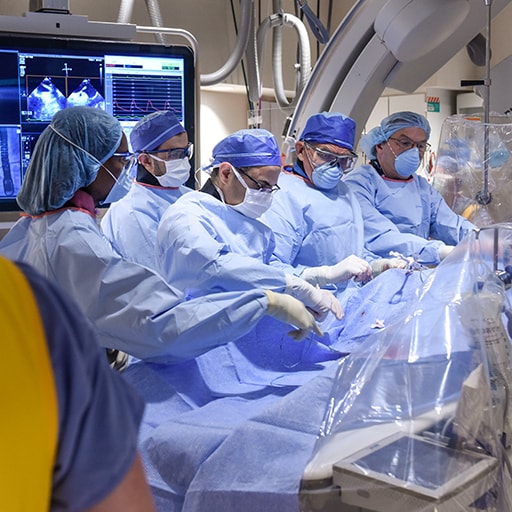Ten benefits of choosing Cardiology Jupiter for cardiovascular well-being
Recognizing the Relevance of Cardiology in Modern Medical Care Providers
Cardiology plays a crucial role in modern healthcare, particularly as cardiovascular disease remains to be the leading root cause of mortality worldwide. Advances in diagnostics and treatment have transformed client care, making it possible for earlier interventions and improved outcomes. Furthermore, the change in the direction of preventative cardiology encourages people to manage their health proactively. As innovation remains to evolve, the assimilation of innovative remedies may better redefine cardiology's impact on public health and wellness, prompting a better examination of emerging trends and their effects.
The Occurrence of Cardiovascular Disease and Its Impact on Public Wellness
Heart illness remains the leading reason of death worldwide, its influence expands far past individual clients to impact public health systems and economies. The high prevalence of heart problem places a significant pressure on medical care sources, necessitating increased financing for prevention, treatment, and rehabilitation programs. Public health efforts must attend to danger elements such as obesity, cigarette smoking, and sedentary way of livings, which contribute considerably to the climbing incidence of heart conditions.Moreover, the economic concern connected with heart problem is enormous, incorporating not just straight medical expenses but also indirect expenses connected to shed performance and premature death. Communities deal with difficulties in managing these prices, often causing disparities in health care accessibility and results. As the population ages and lifestyle-related dangers proceed to rise, the necessity for efficient cardiology treatments comes to be paramount. Resolving heart illness is not only an issue of private wellness yet also a vital public health priority.
Developments in Cardiac Diagnostics and Imaging Techniques
Current improvements in heart diagnostics and imaging techniques have transformed the area of cardiology, enhancing the ability to keep track of and find heart illness. Techniques such as heart MRI, CT angiography, and echocardiography have actually come to be progressively advanced, supplying thorough photos of cardiac structures and features. These modalities enable the early identification of conditions like coronary artery condition, cardiac arrest, and valvular disorders.Moreover, innovations in non-invasive diagnostics, such as wearable technology and remote monitoring tools, have empowered individuals and doctor. These tools promote real-time monitoring of heart rhythms and various other important indicators, bring about timely treatments. In addition, expert system is being integrated into imaging evaluation, boosting accuracy and performance in diagnosis.
Advancements in Treatment Alternatives for Heart Issues
Recent improvements in cardiology have actually caused considerable technologies in therapy options for heart problems. These consist of sophisticated surgical techniques that improve procedural results and arising medications that provide new avenues for treatment. As the area evolves, these technologies play an important function in enhancing person treatment and outcomes.
Advanced Surgical Techniques
Innovations in medical techniques have changed the landscape of cardiology, supplying brand-new hope for clients with heart disease. Minimally invasive treatments, such as catheter-based treatments, have actually greatly decreased healing times and healthcare facility remains. Methods like robotic-assisted surgical procedure enhance accuracy, enabling cosmetic surgeons to navigate complicated physiological frameworks with greater accuracy. Moreover, innovations in imaging innovation promote real-time visualization during procedures, improving results. Transcatheter aortic valve replacement (TAVR) exhibits an innovation in treating aortic constriction, making it possible for shutoff substitute without open-heart surgery. Furthermore, hybrid strategies that combine catheter-based and surgical approaches give tailored services for different cardiac problems. These advanced surgical methods not just improve individual safety and security but additionally expand treatment choices, highlighting the critical duty of technology in modern-day cardiology methods.
Arising Treatments and medicines
As the landscape of cardiology remains to progress, emerging medications and therapies play a critical duty in improving treatment options for heart conditions. Innovations such as unique anticoagulants and progressed lipid-lowering representatives have changed the management of cardio conditions, greatly decreasing client morbidity and death. Furthermore, the growth of genetics treatments and regenerative medication uses appealing avenues for treating problems formerly considered permanent. Medical tests are continually disclosing the effectiveness of these treatments, pressing the borders of conventional therapies. Moreover, the combination of electronic health technologies facilitates individualized medication, permitting customized therapy strategies based upon genetic and way of life factors. Collectively, these improvements emphasize the dynamic nature of cardiology, boosting person outcomes and redefining requirements of care in contemporary health care.
The Duty of Preventive Cardiology in Patient Treatment
Preventive cardiology plays a crucial function in individual treatment by concentrating on the recognition of threat elements that add to cardiovascular disease. With way of life adjustment strategies and very early discovery methods, health care carriers can efficiently decrease the occurrence of cardio events - Cardiology care. This positive technique not just enhances individual results however additionally promotes long-term health and wellness
Threat Variable Recognition
While cardio conditions remain a leading source of morbidity and death worldwide, effective danger element identification acts as a cornerstone of preventative cardiology. Determining danger factors such as hypertension, diabetes mellitus, hyperlipidemia, and family members background is essential for very early treatment. Health care specialists utilize numerous screening methods to review these variables, permitting for customized safety nets. Furthermore, understanding a person's way of living options, such as smoking and physical lack of exercise, further educates risk assessments. This detailed evaluation makes it possible for clinicians to create individualized care strategies targeted at mitigating dangers. By prioritizing danger element identification, medical care systems can enhance individual results and minimize the total problem of cardio illness, inevitably contributing to improved public wellness approaches and resource allocation.
Way Of Life Adjustment Approaches
A wide range of researches highlights the crucial role of way of life alteration techniques in lowering heart disease danger. great post to read These strategies incorporate nutritional modifications, raised physical task, cigarette smoking cessation, and weight administration. By taking on a heart-healthy diet plan abundant in fruits, vegetables, entire grains, and lean healthy proteins, people can decrease cholesterol levels and high blood pressure. Regular physical activity strengthens the heart and boosts general cardio health. In addition, quitting smoking substantially minimizes the risk of heart disease and enhances recovery rates for those with status quo. Weight administration additionally contributes to cardio health and wellness by mitigating various other risk elements such as diabetic issues and high blood pressure. Implementing these lifestyle changes not only promotes private well-being however likewise acts as a keystone of preventative cardiology in client treatment.
Early Discovery Methods
Lifestyle modifications significantly add to decreasing heart disease risks, however they are most effective when coupled with very early detection strategies. Preventative cardiology highlights the significance of recognizing possible heart problems before they escalate right into severe conditions. Strategies such as blood pressure tracking, cholesterol screening, and progressed imaging modern technologies like echocardiograms play important functions in assessing cardiovascular wellness. Biomarkers and genetic screening likewise improve the precision of early discovery, enabling for customized preventative techniques. Normal cardiac image source threat evaluations equip doctor over at this website to intervene proactively, possibly protecting against heart assaults and strokes (Cardiology Jupiter). By incorporating these very early detection techniques right into regular treatment, patients can take advantage of prompt way of living interventions and targeted treatments, eventually boosting outcomes and boosting top quality of life
Integrating Technology Into Cardiology Practices
As developments in modern technology remain to improve various fields, the combination of cutting-edge devices and systems right into cardiology practices has become vital for boosting patient care and results. Telemedicine platforms permit cardiologists to keep an eye on individuals from another location, boosting accessibility to care while reducing the concern on health care facilities. Wearable gadgets, such as smartwatches, allow constant heart rate monitoring, notifying both clients and doctors to prospective problems in real-time. Furthermore, expert system (AI) is being made use of to assess huge amounts of cardiac data, aiding in very early medical diagnosis and individualized treatment plans. Advanced imaging techniques, including 3D echocardiography, boost visualization of heart frameworks, causing a lot more accurate interventions. Digital health records (EHRs) simplify person info management, ensuring that cardiologists have prompt accessibility to important data. Together, these technical improvements are transforming cardiology, advertising positive management and boosted health and wellness outcomes for clients with cardio conditions.
The Relevance of Individual Education And Learning and Interaction
Person education and involvement play a critical duty in the management of cardio health. By gearing up people with knowledge regarding their conditions, therapy alternatives, and way of life modifications, healthcare suppliers encourage individuals to take an active function in their care. This positive technique can lead to improved adherence to recommended drugs, nutritional changes, and exercise programs, ultimately lowering the risk of complications.Engagement also promotes a strong patient-provider connection, urging open interaction and trust. When individuals really feel educated and entailed, they are more probable to voice issues and ask concerns, which can cause much better scientific outcomes. Furthermore, academic resources, such as workshops or digital platforms, can improve understanding and promote self-management techniques. In general, prioritizing person education and learning and involvement is essential for enhancing cardio wellness, boosting top quality of life, and lowering medical care prices connected with heart diseases.
Future Patterns in Cardiology and Their Prospective Impact

Regularly Asked Concerns
What Lifestyle Changes Can Lower Heart Condition Danger?
The present concern addresses lifestyle adjustments that can considerably decrease heart disease threat. Cardiologist near me. Embracing a balanced diet regimen, involving in routine physical activity, keeping a healthy and balanced weight, managing stress and anxiety, and preventing tobacco can especially improve cardio health and wellness
Exactly How Can I Acknowledge Very Early Indications of Heart Problems?
Acknowledging early indications of heart problems includes monitoring signs such as chest discomfort, shortness of breath, tiredness, and irregular heartbeat. Prompt awareness of these indications can prompt required clinical assessment and intervention for much better outcomes.
What Are the Differences In Between Cardiologists and Cardiac Surgeons?
The differences in between cardiologists and cardiac specialists hinge on their roles; cardiologists primarily manage and identify heart disease through non-invasive techniques, while heart surgeons do procedures to correct structural heart concerns. Each plays a vital, distinct function.

Exactly how Frequently Should I Obtain My Heart Wellness Checked?
The regularity of heart checkup varies based upon private risk factors. Usually, adults should undertake examinations each to two years, while those with status quo may call for even more frequent analyses as encouraged by healthcare specialists.
What Function Does Genes Play in Heart Problem Risk?
Genes considerably influences cardiovascular disease danger, with domestic patterns suggesting acquired conditions. Specific genes can predispose people to hypertension, cholesterol concerns, and other cardio issues, highlighting the relevance of genetic testing in assessing heart wellness. Heart illness continues to be the leading cause of fatality internationally, its impact prolongs much beyond private patients to impact public wellness systems and economies. Public health and wellness initiatives need to address danger factors such as weight problems, smoking cigarettes, and sedentary way of lives, which add greatly to the increasing occurrence of heart conditions.Moreover, the financial concern connected with heart condition is immense, incorporating not just direct medical expenses yet additionally indirect expenses associated to shed efficiency and early death. Preventive cardiology plays a necessary duty in patient care by focusing on the identification of danger variables that add to heart condition. Artificial intelligence (AI) and device discovering are boosting diagnostics and patient tracking, allowing early detection of heart illness. The differences between cardiologists and cardiac cosmetic surgeons lie in their functions; cardiologists mostly manage and diagnose heart conditions through non-invasive methods, while cardiac surgeons perform medical treatments to deal with architectural heart problems.